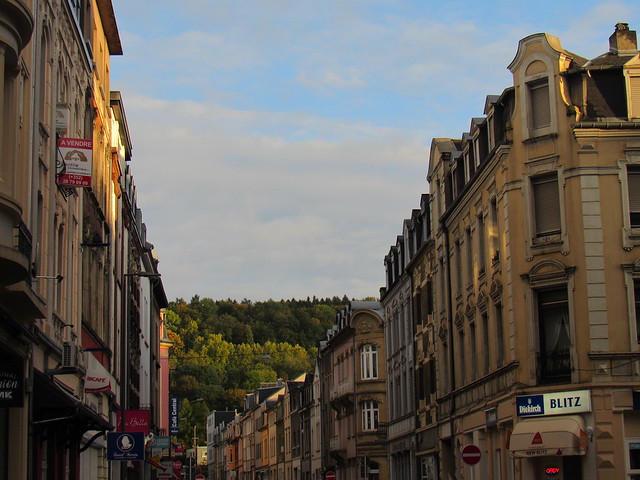“Moien” is one of the first words I learned in Luxembourg, and is probably the one Luxembourgish word that I use every day (sometimes just because of how cute and bright it sounds). Luxembourg has three national languages – Luxembourgish, French, and German – but most people I have met can speak more than four languages with ease. On my first day at Lycée de Garçons, I discovered that over half the class had another mother tongue (such as Portuguese, Italian, Hungarian, and Farsi). Many people change languages mid-conversation to express an idea in a different light, or to accommodate a monolingual newcomer.
This impressively high, seemingly-casual degree of multilingualism never fails to inspire me and sometimes causes me to stress-eat Carrefour tabouleh as I re-download German Duolingo and create Spanish flashcards for the fifteenth time.
At the University of Luxembourg, however, the focus is almost always literature in English. I’ve spent the majority of my ETA experience in this setting, where I am lucky enough to be co-teaching with Professors Agnès Prüm and Anne-Marie Millim. Co-teaching courses such as American Studies: Texts and Contexts, Imagining the Future: Utopia and Dystopia, Women’s Writing, and Literary Theory has truly been a dream for my English major-y self. I have felt very much at home in this engaging, supportive, and over-caffeinated English department, thanks in large part to Agnès, who is my main mentor (and occasional spiritual life-coach). As the literary focus is mainly post-structural and the pedagogical approach discussion-based, students are encouraged to constantly challenge traditional binaries and hierarchies –which is fascinating as they are a really diverse group in terms of home country, mother tongue, cultural group, and upbringing.

At the Lycée, however, most of my lessons have focused on political, social, and international dilemmas – the most popular revolving around Internet memes and their influence on American culture. As a class, we broke down the most influential memes, tweets, and hashtags that came out of the 2016 Presidential election, and underlined the importance of technological literacy in our day and age. This lesson was such a rich, timely, and hilariously absurd way to connect with the students – and stands as a testament to the trust and good humor of Liane and Marianne (two of my Lycée mentors).
Outside of class, I’ve been able to explore many other interests of mine. I studied German for a semester, worked as a volunteer tutor for refugee students, travelled so much that I honestly feel like a Ryanair sponsor, and welcomed tons of family and friends who made the journey out to Luxembourg to see me. My parents in Hawai’i bought their tickets the day I received my acceptance e-mail, coming to Europe for their first time last October. In a twist that I am still not emotionally recovered from, my sister and her now-fiancé came to visit me in late March, and they actually ended up getting engaged in Luxembourg Ville at Le Bouquet Garni. My boyfriend is also visiting me now, currently drinking his third coffee of the day before noon and recovering from his 30-hour voyage.
Clearly, Fulbright hasn’t just put Luxembourg on the map for me, but also for a huge, supportive, and adventurous circle of my loved ones. I’ve also met so many kind friends here, both in the Luxembourg Fulbright Family™ and outside it – and for all of these reasons, I know it is going to be a very difficult and bittersweet Addï.
Jessica Busek is a 2017-2018 American Fulbright English Teaching Assistant to Luxembourg. A recent graduate of University of Portland, she spent the academic year teaching English at the Lycee de Garcons Esch-sur-Alzette and the University of Luxembourg. Articles are written by Fulbright grantees and do not reflect the opinions of the Fulbright Commission, the grantees’ host institutions, or the U.S. Department of State.